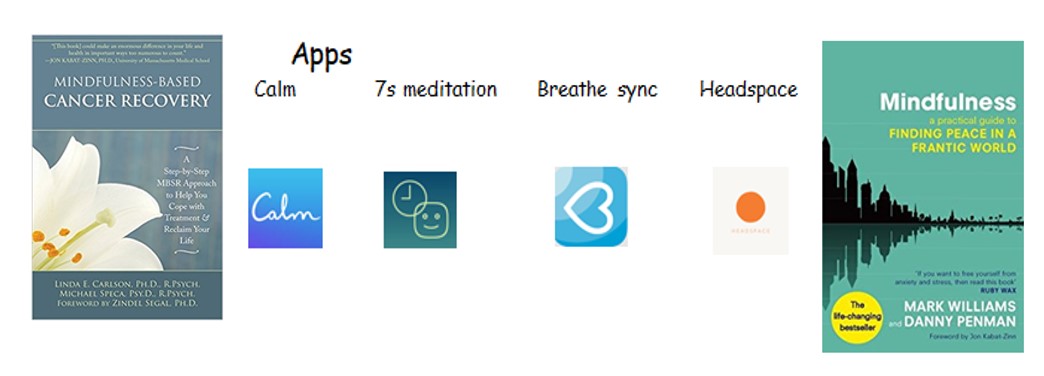Managing emotions
Introduction to Managing Emotions section
The aim of this section is to introduce ways you can help to support your emotions, and to signpost you to further online resources and organisations who can help. Talking to others is an important part of dealing with your emotions, and this includes talking to your family members and friends, professionals and volunteers outside your family and also meeting other patients for peer support.
Our message is to include a plan to look after your emotions as you go through your cancer journey and to be aware of your emotions and how they change.
How can you take care of your emotional wellbeing?
There are various techniques you can try to take care of your emotional wellbeing. Below are some suggestions for you, which can be adapted as you go through your cancer journey:
You can try some relaxation and breathing exercises such as these from the Kirklees Wellness Service or from NHS Scotland.
Five suggestions that you may find helpful to take care of your emotional wellbeing:
1. Breathing exercises
How we feel (such as stress and anxiety) can have an impact on the body. We can feel muscle tension and joint pain, increased heart rate and headaches. Some simple forms of breathing methods can help to relax the body and in turn the mind. This is because when you breathe deeply, it sends a message to your brain to calm down and relax. For example, breathing in for 4 seconds and out for 6 seconds, with the aim of slowing down your breathing by taking longer, deeper breathes.
2. Nourishing/depleting activities
At times of higher stress, how you spend your time may be dominated by appointments and recovery from treatment side effects. It can help to notice how you are spending your time outside of this and whether you are doing more depleting activities rather than things you find nourishing and rewarding. We suggest you could make a list of those things in your life that you enjoy doing, things which nourish and enrich you, and a list of things that deplete you. Try to add an extra nourishing activity into your day and reduce the depleting things you do.
3. Goals, expectations and pacing yourself
Particularly during and after treatment, you may find that you need to be more flexible and kinder with the goals and expectations you set for yourself. It can help to break down your goals into achievable steps based on what you feel able to do at the time, such as instead of going for the 10 mile walk you may have previously done, go for a 15 minute walk. Pacing yourself and ensuring there is time to rest and to find balance with how you spend your time can be really helpful to review and adjust.
Sometimes this may need to involve you being kind to yourself, such as to say ‘’it’s okay I need more time to rest now" or "I need others to help me to do the things I normally could do on my own". It can help to ask yourself "what would a compassionate friend say to me right now?".
4. Talking to others
Talking about your experiences can be an important and helpful part of managing your emotions for some people. This might include talking to family members and friends, professionals and volunteers outside your family or meeting other patients for peer support. Many people say they wish they had talked to people sooner, rather than letting their emotions build up.
5. Mindfulness
Mindfulness is the quality of being present and fully engaged with whatever we are doing at the moment — free from distraction or judgment, and aware of our thoughts and feelings without getting caught up in them. Mindfulness meditation can teach our mind in this moment-to-moment awareness and help us to build this skill so that we can apply it to everyday life. This can be helpful when faced with challenging circumstances or difficult situations.
Focus on the present moment and try Mindfulness –a technique to manage thoughts and feeling
Here are some mindfulness videos by one of our Calderdale and Huddersfield Foundation Trust Hospital Mindfulness practitioner, Prasadu Prasadu.
Introduction to mindfulness
Mindfulness of breathing
Mindfulness of physical sensations
Mindfulness of the mind
Nourishing/depleting activities
Make a list of those things in your life that you enjoy doing, things which nourish and enrich you, and a list of things that deplete you. Try to add an extra nourishing activity into your day and reduce the depleting things you do.
Goals and expectations
Set small and obtainable goals for yourself such as going out for a walk. Think about manageable tasks, which can be achieved now rather than complex goals for the future.
Talking to others
Talking is a very important part of managing your emotions and includes talking to family and friends but also those outside of your immediate situation. Many cancer patients and relatives say they wish they had talked to people sooner, rather than letting their emotions build up.
Show self-care; self-compassion; think about what would a compassionate friend say to you now.
Pace yourself – think about planning some rest amidst your busyness.
Try to find things to be grateful for – gratitude can help your wellbeing.
Resources to manage your emotions
Below are some links to resources which may be helpful to you as you think about supporting and managing your emotions.
Resources and tips to manage your emotions on the Macmillan website
Top Tips to improve your mental wellbeing from ‘NHS One You: Every Mind Matters’
This also includes information about sleep, stress, anxiety and low mood. Click here to sign up to receive your own mental wellbeing plan.
The website MIND has lots of useful information about coping with staying at home and looking after your mental health during the coronavirus to access click here.
You can also download some apps and read books which help with relaxation, breathing, meditation etc. Some of these are free and some have a cost:
You could try the Daylight NHS App (developed by Big Health) click here to access.
Daylight is a smartphone-based app that provides help to people experiencing symptoms of worry and anxiety, using evidence-based cognitive behavioural techniques, voice and animation.

People and Services to Support Your Emotions
Macmillan Information Service –provides a listening ear and emotional support for patients and carers/family members
CNS support – your clinical nurse specialist is trained to provide emotional support
Support groups through the Macmillan Information Service providing peer support through the Macmillan Coffee Time/Singing Group/Walking Groups.
Other local and regional support groups provide key peer support. e.g. bowel/blood cancer/upper GI support groups.
Cancer Psychology Service
If you do notice difficulties, especially if it affects your ability to carry out normal activities - you may want to consider a referral for talking therapies. The cancer psychology service offers short or longer term psychological support according to what you may need. If you’re unsure, speak to a staff member, they can advise and refer if they think this service would be helpful for you.
If you have have a question for the First Steps team please submit it on the form below
Please note, if your question needs an urgent response you should contact your clinical team directly.
The First Steps team aim to respond to your question within a few days. Please bear in mind the information team's working days are Monday to Friday. Any questions submitted may be used anonymously as part of the frequently asked question section of the First Steps website.

















